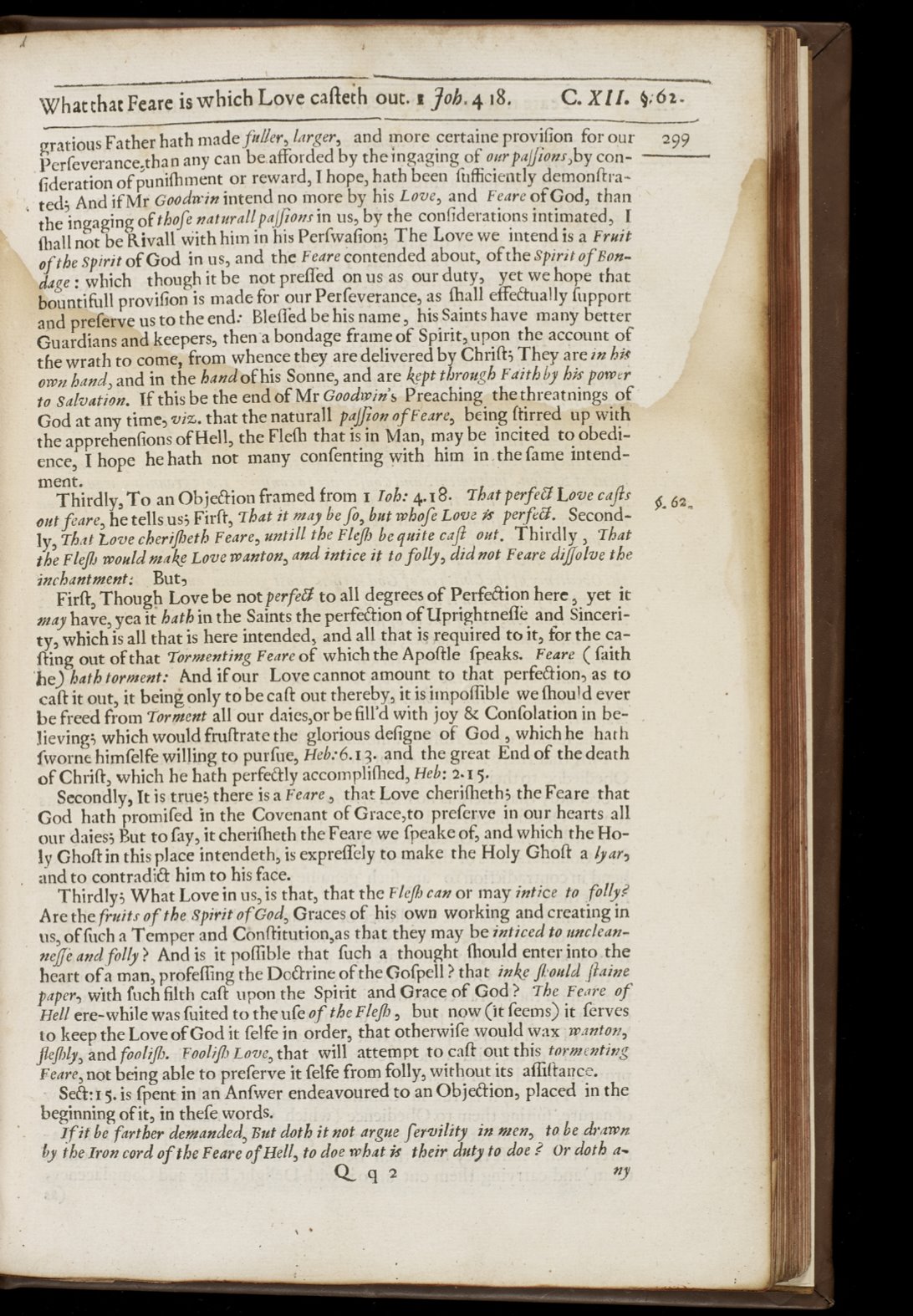

Whatchat
Feare
is
which Love cafleh
out.
-i
job.
418.
C.
XII.
4:6z.
gratious Father hath made fuller,
larger,
and
more
certaine provifion for
our
Perfeverancethan
any
can
beafforded
by
the
engaging
of
our
paJons,by
con
-
fideration
of
punithwent
or
reward,
I
hope,
bath
been
fnfficiently
demonflra-
ted;
And
if
Mr
Goodwin
intend
no more
by his Love,
and
Feare
of
God, than
the
ingaging
of
thof
e
naturall
paffìons
in us,
by
the
confederations
intimated,
I
fhall
not
be
Rivall with
him in
his
Perfwafion;
The
Love we intend
is
a
Fruit
of
the
spirit
of
God
in
us, and
the
Feare
contended about,
of
the spirit
ofBon-
dage
:
which
though
it be
not
preffed on us
as
our
duty,
yet
we
hope
that
bountiful] provifion
is
made
for our Perfeverance,
as
(hall effectually
fupport
and
preferve
us
to
the end:
Bleffed
be
his
name
, his
Saints
have many
better
Guardians and keepers, then
a
bondage frame
of
Spirit,upon the
account
of
the wrath to
come,
from whence they are delivered by Chrift;
They
are in
his
own
hand,
and
in
the
hand
of
his
Sonne,
and are
kept
through
Faith
by
his power
to
salvation.
If
this
be the end
of
Mr
Goodwin's
Preaching
the
threatnings
of
God
at
any
time,
viz,
that
the naturall
paon
of
Feare,
being ftirred up
with
the
apprehenfions
of
Hell,
the
Flefh
that
is
in Man, may
be incited
to
obedi-
ence,
I
hope he
hath
not
many confenting
with
him in
the
fame
intend-
ment.
Thirdly,
To
an
Objeelion framed
from r
loh: 4.18.
That
perfeC.
Love calls
out
feare, he tells us; Firft,
That
it
may
be
fo,
but
whole Love
ss
perfaI.
Second-
ly,
That Love cherifbeth Feare,
untill
the
Flefli be
quite call
out.
Thirdly
That
the
Flefh
wouldmake Love wanton,
and
intice
it
to
folly, did
not Feare
difolve
the
inchantment:
But,
Firtt,
Though
Love
be not
perfeti'
to
all degrees
of
PerfeEtion
here yet
it
may
have,
yea
it
bathin
the
Saints
the
perfeetion
of
Liprightneflè and Sinceri-
ty,
which
is
all
that
is
here intended, and all
that
is
required
to
it,
for
the ca-
lling out
ofthat
Tormenting Feare
of
which
the
Apoftle
fpeaks.
Feare
(faith
le)
bath torment:
And
if
our Love cannot amount
to that
perfe&ion,
as
to
cart it
out, it being
only
to
be cati out thereby,
it
is
impoffìble
we fhoul d
ever
be
freed from
Torment
all
our
daies,or
be
fill'd
with joy
&
Confolation
in
be-
lieving; which would fruftrate the glorious defigne
of
God
,
whichhe
hath
fworne
himfelfe
willing
to
purftre,
Heb: 6.
r
3..and the great End
of
the death
of
Chrift, which he hath
perfeWtly
accomplithed,
Heb:
2.15.
Secondly,
It
is
true;
there
is
a
Feare,
that
Love cheritheth;
the
Feare
that
God hath promifed
in
the Covenant
of
Grace,to
preferve
in
our
hearts all
our daies;
But
to
fay,
it cheritheth the Feare
we
fpeake of, and which
the Ho-
ly
Ghoft
in
this place
intendeth,
is
expreffely
to
make the
Holy.
Ghott
a
lyar,
.
and
to
contradi& him
to
his face.
Thirdly; What
Love
in us,
is
that, that the
Flefh
can
or may
intiee
to folly?
Are
the fruits
of
the Spirit ofGod, Graces
of
his own
working
and
creating
in
us,
of
fuch
a
Temper
and Cònítitution,as
that
they may
be
inticed
to
unclean
-
nefè and folly? And
is
it
pofìible
that
fuch
a
thought
(
hould enter into,
the
heart
ofa
man, profefíing
the Dc&rine
of
the
Gofpell
?
that
inke
(Mould
chine
paper,
with fuch
filth
cafe
upon
the
Spirit and Grace
of
God
?
The
Feare
of
Hell
ere-while
was fuited
to the
ufe
of
the Flefh,
but
now
(it
teems)
it
ferves
to
keep
the
Love
of
God it
felfe in
order, that
otherwife would wax
wanton,
flefhly,
and
foolifb.
Foolifb
Love,
that
will
attempt to
cart
out
this tormenting
Feare,
not being able
to
preferve
it
felfe
from folly,
without
its afíìttance.
Sett:
i
5.
is
fpent
in
an Anfwer
endeavoured
to
an
Obje&ion, placed
in
the
beginning
of
it,
in
thefe words.
I
f
it
be
farther
demanded,
But
doth
it
not argue
fervility in
men,
to
be
drawn
by
the Iron
cord
of
the Feare
of
Hell,
to doe
what
is
their
duty
to doe
?
Or
doth
a-
Q
cl
2
ny
299










